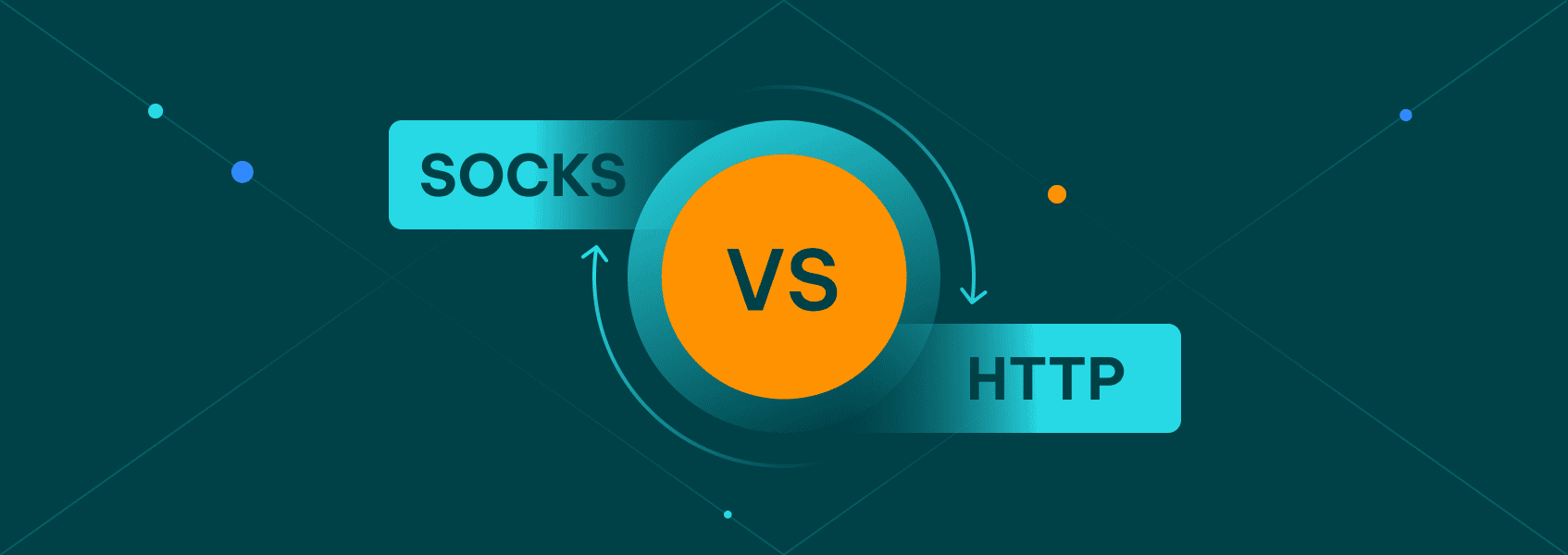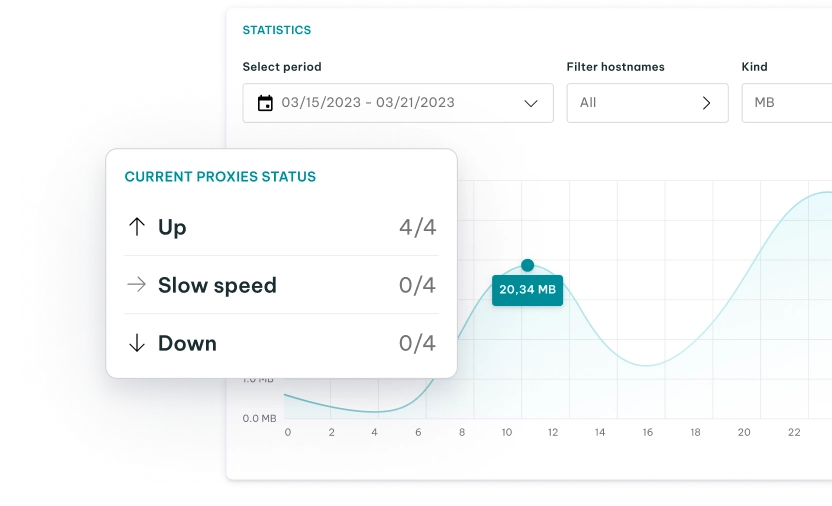SOCKS vs. HTTP Proxy: Breaking Down the Key Differences
Proxy fundamentals

Vilius Dumcius
Choosing the right proxy type helps to streamline online operations and save resources to optimize other tasks. HTTP and SOCKS proxies are among the most popular proxy types with unique features and use cases.
To help you decide, we outlined the main SOCKS vs. HTTP proxy differences and applications for various web browsing activities. Let’s take a deep dive!
What Are the Key Differences Between SOCKS and HTTP Proxies?
HTTP is Hyper Text Transfer Protocol which regulates data exchange over the World Wide Web. HTTP protocol allows clients (usually web browsers) to request specific data from servers. For example, when you read this blog post, your web browser uses this protocol to ask for HTML, CSS, image, and video data from our servers.
As you might’ve guessed, an HTTP proxy is a proxy server that utilizes HTTP protocol. Instead of establishing direct client-server communication, it reroutes online traffic through a third-party proxy that obfuscates the original and assigns a new IP address – a robust online privacy protection tool.
Check out this video to learn more about the HTTP proxy:
SOCKS protocol stands for Socket Secure and provides more versatile use cases. Like HTTP, SOCKS proxies also hide the original user IP address, but they are not limited to one protocol. The main difference between a SOCKS vs. HTTP proxy is that the former can use TCP, UDP, DNS, and more internet protocols. Check you connection in our TCP checker. Simultaneously, the SOCKS protocol can use any port. Meanwhile, the HTTP protocol is restricted to port number 80.
Another essential difference is different levels of speed and security. Tunneling through a SOCKS proxy provides better speed and latency optimized for large data transfers, especially over UDP protocol . Another thing to remember is that the HTTP protocol has one simple authentication method. Meanwhile, the latest SOCKS implementation – SOCKS5 protocol – offers three different authentication methods. Because of advanced authentication, all of IPRoyal’s residential proxies support the latest SOCKS5 protocol.
How Does a SOCKS Proxy Differ From an HTTP Proxy in Terms of Functionality and Protocol?
Most differences arise from the fact that SOCKS proxies can utilize various ports and protocols. That’s why they can be used with applications that don’t support proxy connections for one reason or another. SOCKS proxies can reroute the web traffic through available ports over the chosen protocol to avoid detection , for example, by allowing P2P traffic over restricted networks.
On the other hand, unlike SOCKS, HTTP proxies can interpret web traffic . That means they can inspect online data flow and control it. You can customize an HTTP proxy to analyze web traffic for malicious elements and block access to the internal network for increased security. More so, HTTP proxies can cache web data, improving the web browsing experience .
What Are the Advantages of Using SOCKS Proxies Over HTTP Proxies?
There are three main advantages of using SOCKS proxy over HTTP. Let’s go over each in detail.
- Speed
SOCKS proxies were developed to maximize large online data exchanges. For example, UDP (User Datagram Protocol) excels at sending data to other IPs without prior communication, handshaking , or expected response. It’s excellent for time-sensitive communication like audio and video streaming and torrenting.
Remember that neither HTTP nor SOCKS protocols apply default encryption. That’s why the latest SOCKS5 protocol can be used alongside SSH (Secure Socket Shell) protocol for additional encryption. Likewise, almost all websites use the upgraded HTTPS version that uses the TLS (Transfer Protocol Secure) encryption protocol.
- Application compatibility
Some applications restrict proxy connections by denying traffic through a specific port reserved for proxy traffic. Because SOCKS proxies are protocol-agnostic, they can use any port and enhance application security by obfuscating the original user IP address .
- Geo-block evasion
Sadly, HTTP(S) proxies are relatively easy to identify and block because they utilize the same internet protocol and port. SOCKS proxies excel at bypassing network-level restrictions or firewall blocks by utilizing the tunneling protocol for open and unrestricted web browsing.
They are a great choice to unblock more streaming content or scrape the web with the highest success rates. With SOCKS5 protocol support, our residential proxies guarantee ~99.7% success rates.
In Which Scenarios Is an HTTP Proxy More Suitable Than a SOCKS Proxy?
It’s useful to understand the SOCKS vs. HTTP proxy distinction in terms of ‘difference’ rather than ‘newer-better.’ SOCKS protocol was developed to fill in the use-case gaps left in the HTTP protocol, but the latter maintains original and valuable features. Here are three scenarios where you should choose HTTP over SOCKS.
- Data caching
HTTP proxies can interpret web data, which means they can identify repetitive requests. When you use an HTTP proxy to read this blog and then refresh it, the proxy will check our websites for changes. Because we did not change anything from your last visit, it will get a 304 HTTP status code , and instead of downloading the same information again, your proxy will load its cache. This greatly improves the web browsing experience and significantly reduces proxy data consumption.
- Security
The same data-interpretation principle is used to secure devices from malicious outside threats. HTTP proxies can be customized to analyze incoming traffic for malicious elements, like SQL injections, and block access. The malicious program will be stopped before reaching the user’s device. You can further extend network security by blocking access to malicious websites, like shady adult or torrenting websites.
- Data collection
Each HTTP request sends a header with user information. You can check if your requests reveal you’re using proxies with our free proxy headers test. HTTP proxies allow modifying this header to bypass website-issued blocks or target specific information. The IP address rotation combined with multiple headers helps avoid IP blocks and online detection and increases web scraping success rates.
Can SOCKS and HTTP Proxies Be Used Interchangeably for Various Purposes?
Yes, as mentioned previously, it’s best to understand SOCKS vs. HTTP proxy in terms of different functionalities, but not an either/or replacement.
HTTP proxies can interpret online web traffic with all its benefits but are restricted to HTTP protocol and port. Simultaneously, SOCKS proxies can utilize any port and protocol but do not analyze web traffic, instead providing better speed and geo-block evasion.
Knowing the difference will help you choose the right proxy for your needs. And if you want to learn more about the many ways to benefit from high-quality proxies, we recommend reading our other blog post on the most common proxy use cases .
FAQ
Are there any specific network requirements or configurations for using SOCKS proxies?
No, SOCKS proxies can utilize any internet protocol and port number to expand use-case versatility. For example, IPRoyal’s backconnect residential proxies support the SOCKS5 protocol and provide secure and unrestricted access to previously blocked sources, bypassing network-level restrictions.
Can an HTTP proxy be used for tasks that typically require a SOCKS proxy, and vice versa?
Sometimes. SOCKS proxies can be used instead of HTTP when they utilize the same internet protocol and port number. However, on most occasions, their use cases do not overlap because SOCKS proxies cannot interpret web traffic, and HTTP proxies have port and protocol restrictions.
What are the potential limitations or considerations when choosing between SOCKS and HTTP proxies?
When choosing between HTTP and SOCKS proxy, you should consider the speed, data transfer size, security, and online restriction requirements. SOCKS proxies excel at faster and larger data exchange. Meanwhile, HTTP proxies can reduce data usage by caching information.


